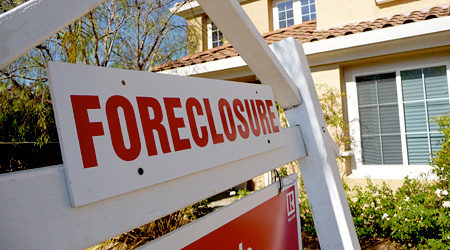How To Make Money By Investing In Foreclosures

For the right individuals, investing in foreclosures can lead to significant returns assuming you have a low risk aversion and are willing to put in the work and time required to be successful. Like any other investment, foreclosures have their pluses and minuses as investment vehicles. If you've always wanted to be a real estate mogul flipping properties like they do on TV then investing in foreclosures may be right for you.
The question many investors ask is how you make money on foreclosures as opposed to standard real estate transactions. The two primary factors in determining the price of a foreclosure are dependent on the remaining balance of the existing mortgage and the quality of the property in question. When a homeowner is making monthly mortgage payments on an existing property it includes a combination of principle, interest and escrow. After a certain period of time, for example 5 to 10 years, a certain amount of principal has been paid on the existing balance. So for example, if a home was purchased for $200,000 and then 10 years later the homeowner defaults on the loan but has paid $40,000 in principal then that leaves an outstanding balance of $160,000 owed. When the bank or credit union forecloses on the property they are looking to recover the $160,000 they are out from the existing note. Most financial institutions have no interest in sitting on foreclosures longer than necessary so they will often take an amount as close to the principle owed as possible.
The other reason a foreclosed property will be sold below market value is because it may currently be in a state of disrepair and therefore not on par economically with other houses of similar size and configuration. Sometimes when homeowners get behind on mortgage payments and are looking at defaulting on the loan they will neglect the house more and more knowing that they will soon be foreclosed upon. As a result, many areas of the house may be damaged and various items may have been removed prior to vacating the premises. If the foreclosed property is severely distressed then a financial institution would find it increasingly difficult to get a fair market rate to comparable houses. In these situations banks may be more likely to accept less than what is owed just to get the property off of their balance sheet. Distressed foreclosures can obviously make investing more risky because it may be unclear how much additional money may need to be invested to get the property up to comparable market quality.
There are only a couple of ways to make money once the property has been purchased. Flipping a house for a profit is the most glamorized way of making money from foreclosures. Many small time investors who fancy themselves real estate moguls will go to a local auction on foreclosed properties and make a purchase looking to flip it for a profit. Investors have to take into consideration that the property may require substantial initial capital in order to make the house viable for resale. There may also be some unexpected surprises if research was not done ahead of time such as existing liens or unpaid property taxes which may cut into profit margins.
The other way to make money by purchasing foreclosures for investment purposes is to sit on the property as a rental instead of selling it outright. This may or may not be a voluntary option considering once a foreclosed property is purchased and renovated it is still up to the market to determine whether or not it sells. If a distressed foreclosure is purchased for $80,000 and then $20,000 is invested in order to resell it then the total cost thus far is $100,000. However, the appraisal value may actually be $120,000 at which point the investor could take out a mortgage for $120,000, pay off the first mortgage of $80,000 while recouping the $20,000 invested netting a profit of $20,000. The foreclosure can then be rented for the monthly mortgage payment and the investor can keep the property without making payments using any of their own capital. This is riskier however because it assumes they can get the foreclosure for cheap, fix it up inexpensively, result in appraised value of more than their total investment thus far and finally be able to find renters willing to pay the monthly mortgage. None of that takes into account the effort and money required to manage rental properties. As you can see there are a lot of variables which may not work out in the investors favor.
Making money by investing in foreclosures is not going to be for everyone. This type of investment can be exciting and profitable but requires significant experience and a lot of time and effort to manage above-average returns. If you have the fortitude and resolve to do the research and enough initial capital to renovate foreclosed properties then investing in foreclosures may be an exciting possibility for prospective land barons.







